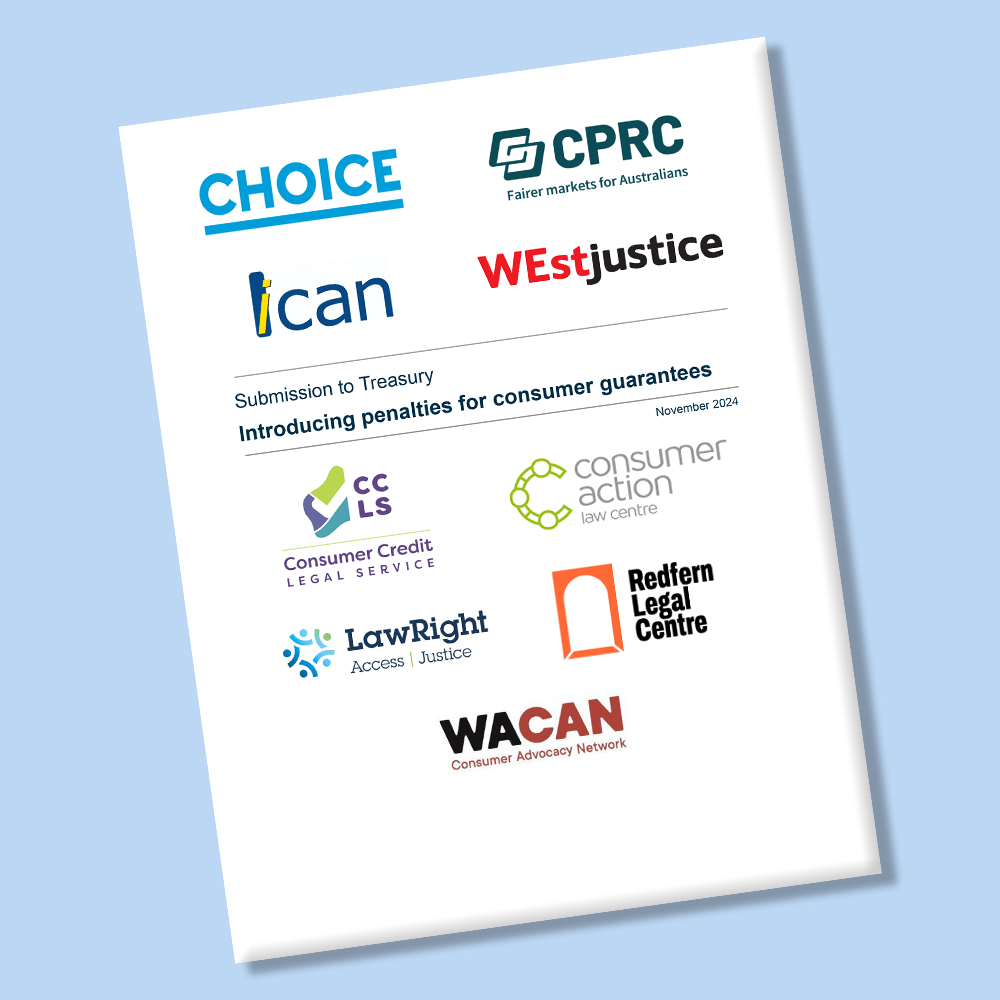
The Indigenous Consumer Assistance Network (ICAN), alongside CHOICE, the Consumer Policy Research Centre (CPRC), Westjustice, Consumer Action Law Centre, LawRight, Redfern Legal Centre, Consumer Credit Legal Service (WA) Inc. (CCLS), and the WA Consumer Advocacy Network, has jointly submitted feedback on the Government’s proposal to introduce civil prohibitions and penalties for breaches of consumer guarantees and supplier indemnification provisions under the Australian Consumer Law (ACL).
Championing Consumer Rights
Our organisations have long assisted individuals asserting their rights under the ACL’s consumer guarantee regime when sold faulty goods or services. Unfortunately, many people face overwhelming challenges navigating these rights, even with the support of experienced consumer advocates. People experiencing vulnerable circumstances, including those on low incomes, are disproportionately affected by these systemic barriers.
Businesses currently lack sufficient incentives to address legitimate consumer claims promptly or fairly. The absence of penalties for breaches undermines enforcement, leaving many consumers without the remedies they are entitled to under law. Overcrowded tribunals and prohibitively expensive court processes further exacerbate this issue, forcing many to abandon their claims entirely. ICAN regularly sees this through its casework, particularly in relation to the sale of faulty second-hand vehicles.
Advocating for Reform
We welcome the Government’s announcement to introduce penalties into the consumer guarantee regime and urge swift progress on this long-overdue reform. Drawing on the insights from prior consultations, our submission includes the following key recommendations:
- Economy-Wide Penalties: Introduce comprehensive civil prohibitions and penalties for breaches of consumer guarantees under the ACL.
- Immediate Action: Prioritise penalties for non-compliance without delay.
- Industry-Specific Guidance: Regulators should clarify major failure criteria for industries with frequent complaints, including motor vehicles, appliances, and sustainable products.
- Durability Standards: Provide clear guidance on reasonable durability expectations and rejection periods.
- Reverse Onus of Proof: Shift the burden of proof for claims made shortly after purchase, requiring businesses to disprove failures within that time frame.
- Timeliness and Costs: Penalise businesses for unreasonable delays in claim assessments or repairs and for charging excessive fees to process claims.
- Technological Adaptation: Reassess the consumer guarantee framework to address emerging issues with AI and technology-integrated goods and services.
- Broad Application: Ensure penalties apply regardless of industry, failure type, or goods/services value.
- Fair Refunds: Eliminate depreciation considerations in refund calculations for faulty goods.
- Online Marketplaces: Expand the definition of “supplier” to enforce guarantees against online marketplaces.
- Manufacturer Accountability: Introduce penalties for manufacturers who fail to comply with supplier indemnification provisions.
Driving Change for Consumer Justice
This reform represents a critical opportunity to ensure businesses are held accountable and consumers receive timely and fair remedies for defective goods or services. Our organisation is committed to supporting a robust consumer protection framework that prioritizes the rights and well-being of all Australians, particularly those most vulnerable.
We call on the Government to advance this essential reform without delay, paving the way for a stronger and more equitable marketplace. Together, we can ensure that consumer guarantees are not just a promise but a protected right.
You can read our joint submission here